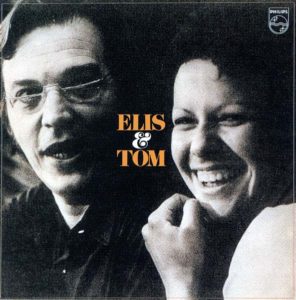Elis Regina & Antônio Carlos Jobim – Elis & Tom Philips 6349 112 (1974)
Tom Jobim was the songwriter of the bossa nova movement. If the genre was always the bourgie version of samba, then Elis & Tom might be the very finest example of those tendencies. This is the album that the mediocre Francis Albert Sinatra & Antonio Carlos Jobim should have been. Elis Regina’s vocals exhibit many of the qualities valued by traditional pop. So her voice is perfectly suited to these treatments of classic Jobim songs set to decadent, refined and classy orchestration and warm electric keyboards. She is especially effective on the slower songs with string arrangements (“Modinha” etc.). And while Jobim’s keyboard playing still has some of the heavy-handed lounge jazz affectations of his past work (Wave, Stone Flower), those qualities are mostly held in check here. Anyone who doubts the range of the genre should listen to this alongside Dez anos depois, João Gilberto, and any of the slightly, lounge-y bossa nova records of the mid-1960s. Even as the same songs are re-worked again and again, there are new perspectives offered. Hardly the stuff of rigid formulas.
Recorded in Los Angeles, this album looks back a bit. Regina saw working with Jobim on the album as a question of confronting a “sacred cow” of Brazilian music. This was a period in which Regina, nicknamed “furacão” (“hurricane”) for her mood swings and one of the the most popular Brazilian singers of all time (nearly as well-known as Carmen Miranda), shifted her music to be more political and critical of the Brazilian military junta. While recording the album, a Brazilian diplomat in L.A. screened Saul Landau & Haskell Wexler‘s documentary (with staged re-enactments) Brazil: A Report on Torture for Regina and Jobim. Screening the film lead to persecution of the diplomat, Jom Tob Azulay, by the junta. While nothing about these old songs is overtly political, the way the album looks back and celebrates the music of the pre-military dictatorship period is tacitly political in a very subtle way.

